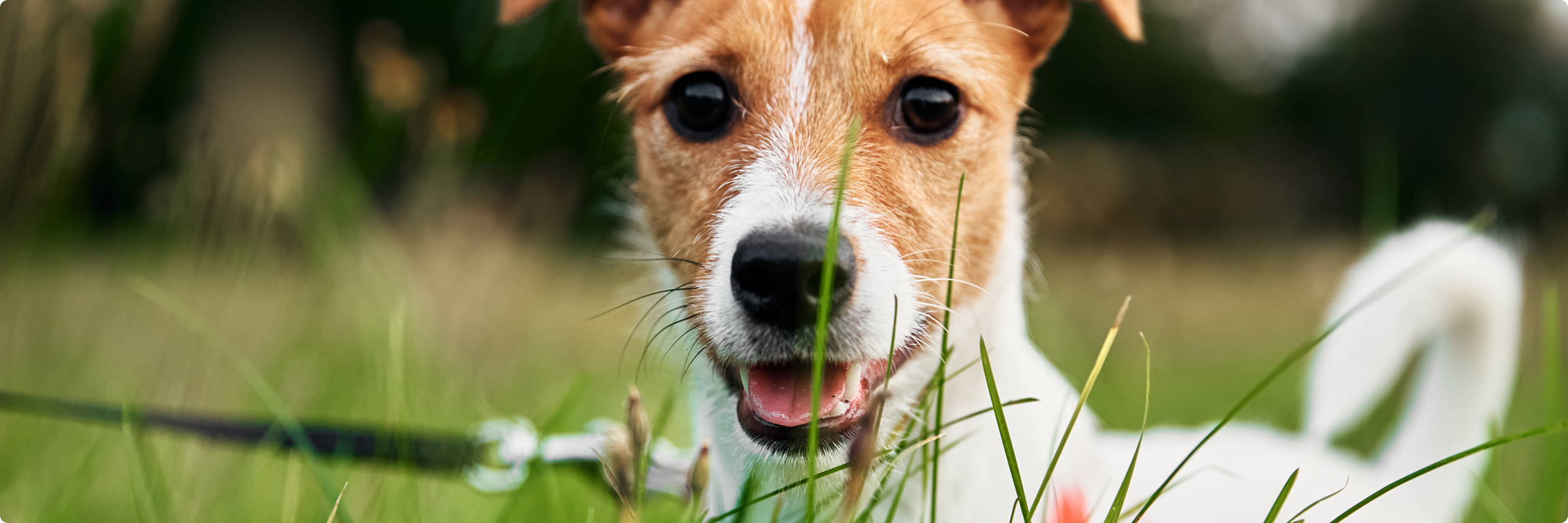Common Pet Toxins in NJ Yards (And What to Do If They’re Ingested)

.png)
1. Toxic Plants Found in NJ Yards
Many of us love to landscape our yards with colorful flowers and lush shrubs—but not all greenery is pet-safe. Some popular plants in New Jersey are toxic to cats and dogs.
Common offenders include:
- Azaleas and Rhododendrons
- Lily of the Valley
- Hydrangeas
- Tulip and Daffodil bulbs
- Foxglove
- Hostas
Even a few chewed leaves or petals can lead to vomiting, diarrhea, or worse, especially in small dogs or curious kittens.
2. Mushrooms (Yes, the Wild Ones)
Mushrooms thrive in shaded, damp areas, especially in early spring and late fall. While many wild mushrooms are harmless, some can be highly toxic to pets.
Signs of mushroom poisoning:
- Drooling
- Vomiting or diarrhea
- Lethargy
- Seizures
- Jaundice or liver failure (in severe cases)
If you suspect your pet ate a mushroom, don’t wait. Contact us at Packanack Animal Hospital (973) 305-3652 or call the ASPCA Poison Control Helpline (888) 426-4435.
3. Fertilizers, Herbicides & Pesticides
Lawn treatments and garden chemicals are a common source of poisoning, especially when pets walk through freshly treated grass and lick their paws afterward.
Potential hazards include:
- Weed killers (glyphosate)
- Slug bait (metaldehyde)
- Bone meal or blood meal fertilizers
- Insecticides and rodenticides
Always keep pets off treated areas for the time recommended on the product’s label and store all garden products securely.
4. Household Foods Used as Natural Pest Control
Some people use natural solutions like garlic or cocoa mulch to deter pests, but these are highly toxic to pets.
- Cocoa mulch (contains theobromine, like chocolate)
- Garlic & onions (damaging to red blood cells)
- Grapes & raisins (toxic to dogs even in small amounts)
5. What to Do If Your Pet Eats Something Toxic
- Don’t panic but act fast.
- Remove any remaining toxin from their mouth or environment.
- Call your vet immediately. Contact Packanack Animal Hospital: 973-305-3652 or call the ASPCA Animal Poison Control Center: 888-426-4435
- Bring a sample or photo of the substance or plant, if possible.
- Avoid home remedies. Inducing vomiting without guidance can be dangerous.
How Packanack Animal Hospital Can Help
If you’re concerned your pet has ingested something toxic, we’re here to help.
At Packanack Animal Hospital, our team can:
- Evaluate symptoms quickly
- Provide emergency care and monitoring
- Guide you on safe yard planning and pet-proofing
We also recommend regular wellness checkups, where we can discuss any potential risks based on your pet’s lifestyle.
Keep Your Backyard Pet-Safe with These Tips
- Remove known toxic plants from your yard
- Supervise pets when outside, especially puppies and kittens
- Store lawn/garden products in locked containers
- Avoid cocoa mulch or home remedies using garlic
- Rinse paws after walks or playtime in treated areas
- Consider fencing off garden beds or mulch zones
Final Thoughts: Prevention Is Key
Your backyard should be a safe space, not a minefield. With a little planning and awareness, you can help prevent accidental poisoning and keep your pet happy and healthy all year round.
If you have any questions about potential toxins, or need to schedule an urgent exam, contact Packanack Animal Hospital today.
.png)
Bringing home a new puppy or kitten is one of the most heartwarming moments a pet parent can experience—but let’s be honest, it can also be a bit overwhelming. Whether you’re a first-time pet owner or just a little rusty, this guide will help you navigate the key areas of care and set your furry friend up for a happy, healthy life.
.png)
Starting life with a healthy foundation is key to your puppy’s long-term wellness. At Packanack Animal Hospital in Wayne, NJ, we know how important timely vaccinations are. In this article, we’ll break down the essential puppy vaccines, explain New Jersey’s requirements, and walk you through the best vaccination schedule for your growing pup.
Same & Next-Day Appointments
We offer same-day appointments to help your furry friend feel better as quickly as possible!
